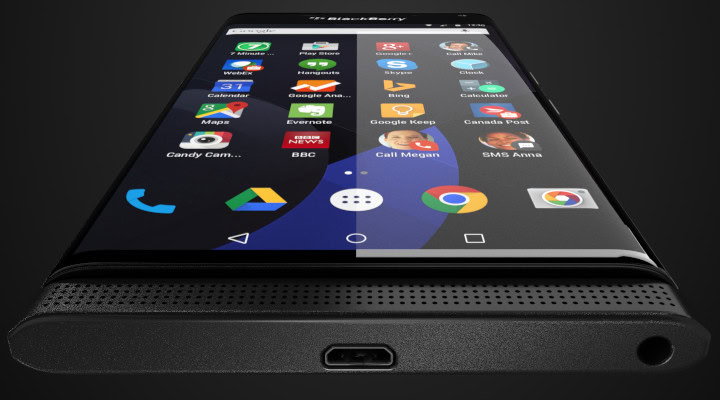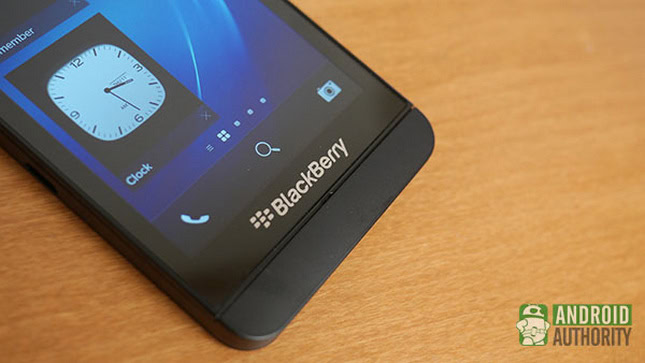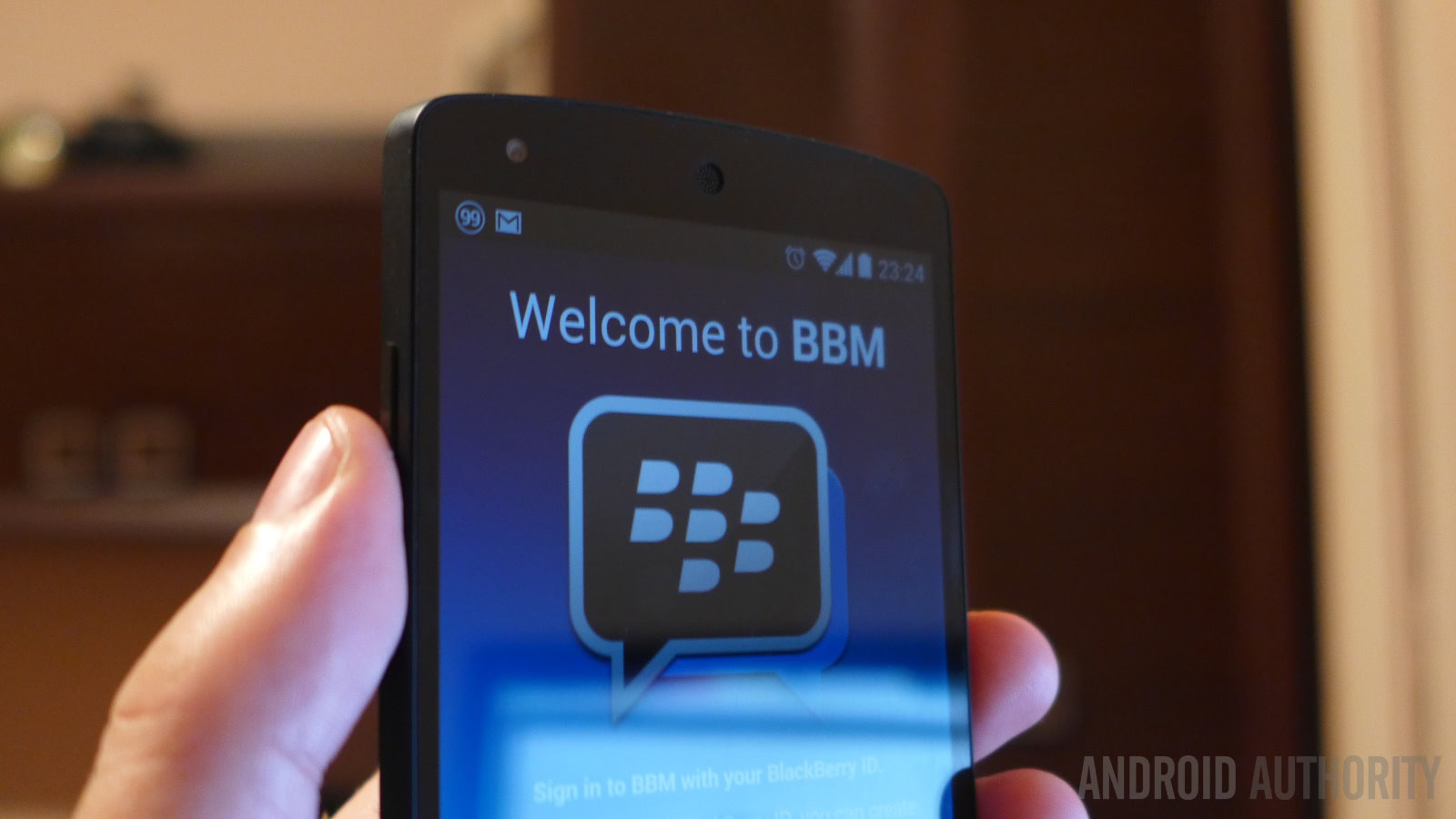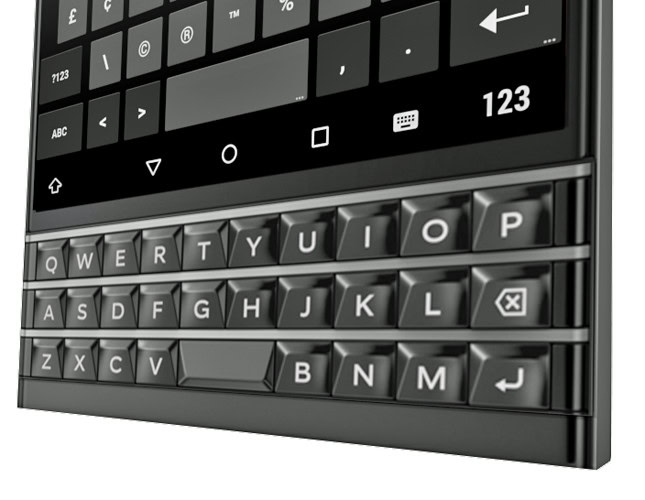Affiliate links on Android Authority may earn us a commission. Learn more.
What is the BlackBerry Venice all about? Should anyone care?
Published onAugust 24, 2015

If you like to read up on the latest smartphones then you’ll know about the rumors concerning a new Android device from BlackBerry. We’ve seen a few BlackBerry Venice image and video leaks posted on Twitter by Evan Blass (@evleaks). The device is supposedly slated for release in November on all four big U.S. carriers. So far, BlackBerry has neither denied nor confirmed the phone will run Android. Is it for real? And if so, what is BlackBerry thinking?
The BlackBerry Venice
If you’ve managed to miss the details, the BlackBerry Venice appears to be a large smartphone with a 5.4-inch, 2560 x 1440 pixel, curved AMOLED display. Slide it up and you reveal a full physical keyboard. It will have a 1.8GHz 64-bit, hexa-core Snapdragon 808 inside with 3GB of RAM. There’s also talk of an 18MP camera with OIS and a 5MP front-facing camera.
We know the phone is real, because BlackBerry showed it off very briefly at MWC back in March, but we don’t know the specs for sure, and back then it appeared to be running BB10. What has really gotten people talking about it is the idea it will run Android 5.0 Lollipop out of the gate. This is based on a bunch of further leaks showing Google services and Android apps on the phone alongside BlackBerry services and apps.
Is it credible?

There are plenty of reasons to believe the Venice could be BlackBerry’s first official Android smartphone, but we won’t know for sure until the company actually says so.
The rumor definitely gathered pace in June after the BlackBerry CEO, John Chen, told CNBC, “We only build secure phones and BlackBerry is the most secure phone so, if I can find a way to secure the Android phone, I will also build that.”
The BlackBerry Venice also looks like it could be the fruit of a closer partnership with Samsung. At the start of the year we looked at the rumors about Samsung and BlackBerry. Samsung CEO, J.K. Shin, told WSJ, “We want to work with BlackBerry and develop this partnership, not acquire the company.” Could Samsung be involved with the BlackBerry Venice? It’s possible, especially if those curved edges are more than just cosmetic.
As for BlackBerry moving its services and apps onto Android, we know that’s happening regardless of this phone. Take a look at BlackBerry’s Play Store wares already. Chen was pretty clear at MWC about the change of strategy to push BlackBerry’s suite of solutions onto new hardware, “We are going to make sure our software addresses everybody’s phone — wearables, vending machines, a rice cooker in your house — anything that has an IP address.”
A BlackBerry Venice that runs Android 5.0 Lollipop, but with a unique BlackBerry veneer on top, delivering greater security and more BB services, is a definite possibility.
Wait a minute…

As much as this is all possible, would BlackBerry abandon the BlackBerry 10 platform? It seems a shame because the company finally got a lot right with BB10 and you can install Android apps on BB10 devices, though the experience isn’t always ideal. But regardless of the merits of BB10, it definitely came too late. According to IDC BlackBerry OS had a 0.3% share of the worldwide smartphone OS market in the first quarter of the year, down from 0.5% in 2014.
Some have suggested that the Venice will come in Android or BB10 versions. That seems like it would just confuse potential buyers. Dual boot isn’t really a viable solution either, it’s not exactly user-friendly and there’s little incentive for Google to agree. If BlackBerry wants success with this handset, then it needs to have some mass market appeal, but adopting Android could definitely be interpreted as throwing in the towel for BB10.
What’s the purpose?

Maybe the Venice is like a reference device that BlackBerry can use to show off a fuller integration of its services with Android and try and drum up more interest in software licensing. It can’t seriously be betting that it will sell enough handsets to get back in the game — that would go against what Chen has been saying about spreading BB’s software onto every device.
There’s a bit of a line to tread. If BlackBerry wants a major hit with the BlackBerry Venice then it will have to have some major USPs, but if it wants more customers using BlackBerry software it will have to roll it out on more Android devices. The latter looks more likely.
A few reports have mentioned BlackBerry’s acquisition of AndroidSecured domains. Try typing androidsecured.com into your browser and take a look. It’s clearly about bringing BlackBerry Enterprise Security to the Android platform, which could definitely be mutually beneficial. Android has security issues, BlackBerry wants on to more devices.
Why buy the Venice?

We took a look at 4 ways BlackBerry could be unique on Android a while back, but BES and BBM are already available on Android devices and maybe the BlackBerry Hub will join them soon. In terms of standing out from the Android OEM crowd that would leave the Venice with BlackBerry’s traditional crown jewel – the physical keyboard.
That could actually still be reason enough for a lot of people to buy it. There aren’t a lot of great options if you want a physical keyboard, though the size of the market for them is debatable. Samsung’s inclusion of the keyboard case for the Note 5 and Edge Plus suggests it thinks that there is some demand, and it also neatly displays how most BB keyboard alternatives are not up to scratch.
The BlackBerry Venice could well be the first official Android smartphone from BlackBerry ushering in closer integration of BlackBerry services and Android, but we’d surprised if that was retained as an exclusive for the Venice handset. If BlackBerry is going to secure a sizeable slice of the Android pie it will need to do it with software not hardware.
Are you excited by the prospect of a Blackberry running Android? If so, what about it appeals most to you?